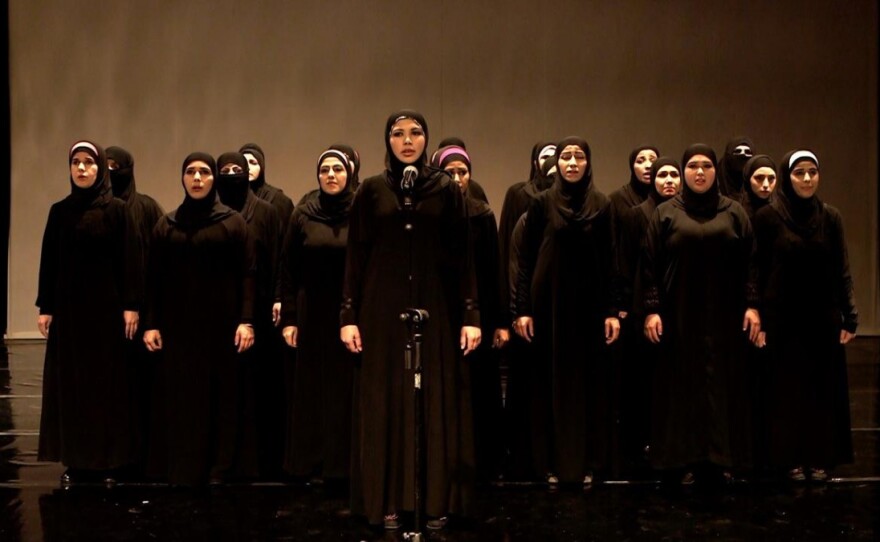As the U.S. debates taking in Syrian refugees and the fallout from the attacks in Paris threatens to take Western empathy for those fleeing war, Yasmin Fedda’s new documentary, “Queens of Syria,” uses an ancient critique of the all out war on a civilian population to bring a new perspective to the current crisis.
The documentary made its U.S. debut at the San Diego Arab Film Festival this past weekend.
The “Queens” of the title are a group of Syrian refugees in Amman, Jordan, working through the concepts in Euripides’ play, “The Trojan Women.” One actress, Fatima, a charming, confident young mother, says"(Queen) Hecuba is like me. She was queen, and lost everything.”
Written more than 2,000 years ago, “The Trojan Women” expresses Euripides’ horror and anger at Athen’s conquest of the island of Milos. Like many of today’s Syrians, the men were killed and the women and children led away into degradation and slavery.
The play is a scathing look at the horrors that can befall a captive population that echoes down to this day.
Fedda follows the adaptation of Euripides by “The Syrian Trojan Women Project,” a project co-produced with Refuge Drama Productions which uses theater as a means of both empowering refugees and helping them through the traumas they have experienced. The goal is to create a multimedia production based on the ancient play while incorporating the women’s stories and experiences.
Fedda deftly weaves interviews, rehearsal and performance to craft a documentary that is funny, touching and tremendously sobering at the same time.
Creating the play itself is not an easy task as Fedda shows, for the Syrian theater director Omar Abu Saada.
Abu Saada and his team start with 60 women at first. All wear a hijab (heardscarf) and some wear a niqab (face veil). Many are middle class while some cannot read or write, and all are non-actors and refugees from Syria. As Abu Saada leads them through theater exercises from how to breathe to how to tell their own stories, we see the women blossom and gather strength.
As the women work with the text, the story of the Trojan women they have come to tell, comes alive for them.
“It’s not just in Troy,” says Maha, one of the main characters. “This is real. It has happened to us.”
The refugees’ own stories are harrowing — relatives executed, beatings, and arrests. They are asked to act out scenes of mistreatment, they create paper maps of how they left Syria and came to Amman.
Some drop out of the production because they fear for relatives still in Syria, others because male relatives fear community scandal if they perform in public. Still others are worried they will be labeled as anti-Assad.
Over the seven week period, the cast goes from 60 to 40 and finally, 25. Their stories become interwoven with those of the Trojan Women.
“Ah, I have reached the end of my sorrows,” the women chant, the voice of Hecuba echoing down the centuries with them.
As the rehearsals progress, one can see the women gradually let down their guard and gather confidence. Glimpses of their reduced existence — rooms bare except for mattresses, crumbling kitchens, underscore the efforts they must make to overcome fear, cultural limitations and personal trauma to participate in the production.
Their ultimate test, opening night, finds them nervous but excited. Some are afraid of falling apart as they tell their stories, one nervously hopes her husband will like the performance.
For Suad, Fedda’s third character, the chance to act is a dream come true. All the time she has spent rehearsing her text while her daughters do their homework, is about to pay off.
The performance itself is spare, elegant and powerful. Dressed in simple black abayas, heads covered with hijabs, some wearing face veils, the women dominate the stage. Fedda’s spare and beautifully exposed photography underscores the performance’s classic, yet sleekly modern look. Her camera is never intrusive and by the end of the film, as it nears opening night, you can see the growing intimacy between Fedda’s camera and the cast of Syrian refugees.
The only real weakness in the documentary is that while Fedda shows their lives as refugees, there is little idea of who the women were before they left Syria except in what we hear in the sections of letters they write to someone left in Syria as a rehearsal exercise. A little context would go a long way to helping the viewer understand how much the women have gone through.
Nonetheless, “Queens of Syria” is a subtle yet telling documentary that effectively shows the damage of war without battle and bombing footage.
While the documentary was released in 2014, the play itself was scheduled to be performed in the U.S. last year. However, performance had to be cancelled because part of the cast could not get visas.
Despite this, Fedda’s documentary does what the women hope to do with the play, give them a voice.
“I want the world to hear our struggles. This isn’t just a play, it’s real. These things exist.”
Goes well with “Cesare deve morire,” (Italy, 2012), "12 Angry Lebanese" (Lebanon, 2009), "Romeo Is Bleeding (U.S., 2015).





